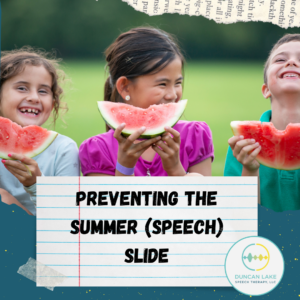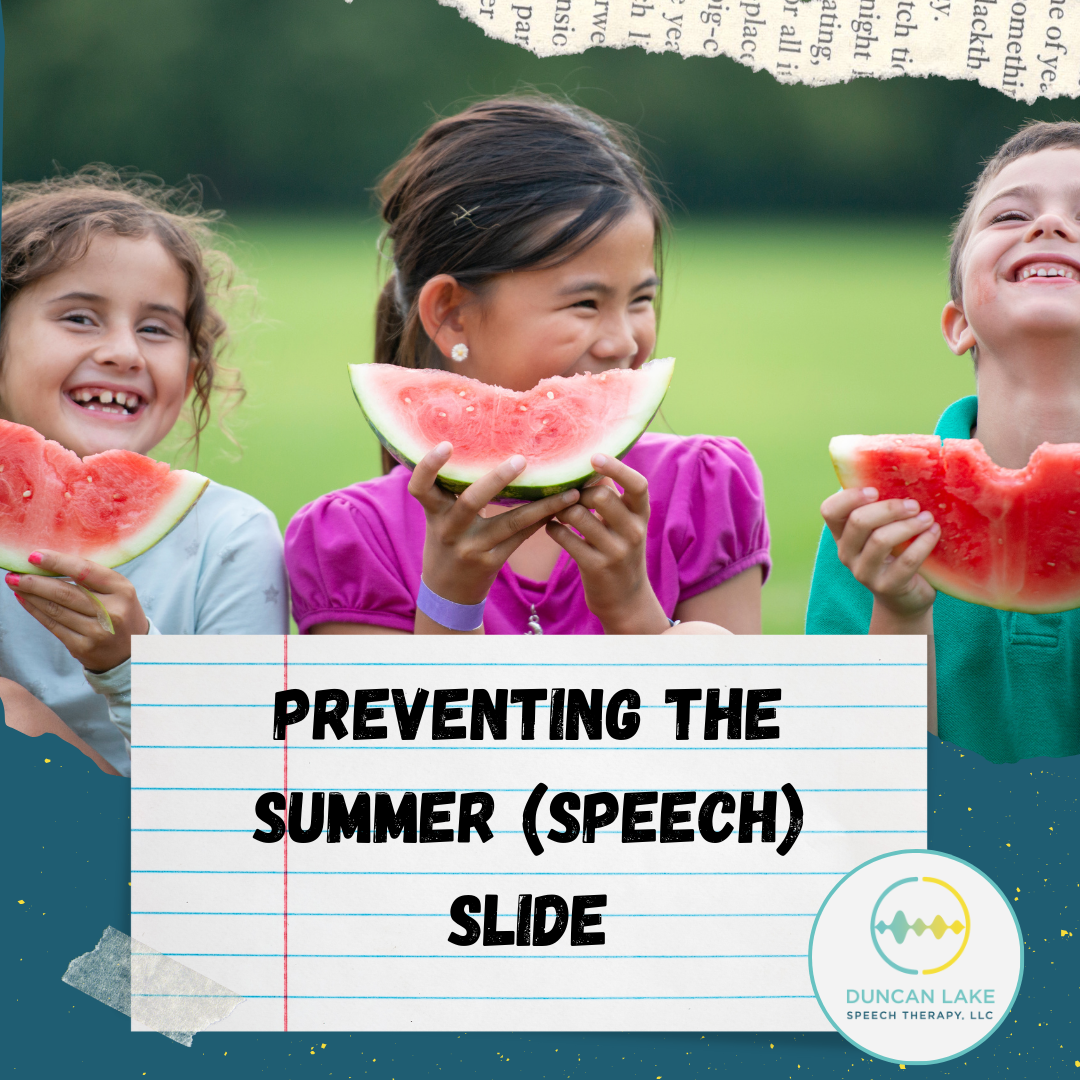Friends, we have made it to the end of the school year School is OUT (or almost out)! Let’s take a moment to celebrate this fact! (Time yourself – one minute, please.)
You should certainly celebrate this accomplishment, but for our friends with speech difficulties, the work does not stop here. Have you heard of the summer slide? Maybe you call it the summer slump? No matter what you call it, summer slide/slump is a decline in skills achieved throughout the year during the summer months. Researchers have found that students lose approximately 1-2 months worth of skill during the summer. The number is disproportionately higher for children in lower socioeconomic homes. For children who have been receiving speech services during the school year (including distance learning speech), 3 months of no speech practice during the summer can tank the progress that has been accomplished.
While it’s good to take a break from the rigors of school for a bit, there are still plenty of ways you can engage your children’s speech and language skills over the summer without having to do any extra work (well, maybe a little, but not too much). Here are some strategies that you can utilize throughout the summer to help keep your child’s speech-language skills robust!

You can work on speech sounds in any activity
Really? YES.
First, double check what sounds they’re working. Not sure what they are? Check your child’s IEP goals. Your child also might be able to tell you. You can use materials from the school SLP to practice (if they were provided), but you can also focus on them during normal activities. Reading is a great time to practice. I even wrote a blog post about it. Focus hard for a small amount of time during an activity (truly, 5-10 minutes!) and then be done with it for the day. Easy peezy!
Read, read, read
Encourage your child to read. To make it more interactive, you could have a family book club. Include cousins, aunts and uncles, grandparents, family friends, whoever! You could also join in with them during their reading time if they will allow it. Or perhaps you could create a family reading competition. Kent District Library offers reading challenges, and is doing one right now for summer. Otherwise, if they will read on their own, that’s great too. No, it does not matter what they read! It’s great that they do read. Our friend, Beth Kirchenberg, wrote a blog post for us on YA literature if you’re interested in learning more about that. Any reading is good reading.
Engage your child in conversation (the weirder, the better)
You talk to your kids constantly about topics pertaining to the house, chores, homework, and the typical goings-on of the family. But how often do you talk about other topics? Like outer space? Or how candy is made? Or ranking their favorite berries from favorite to least favorite (Hello, Staying Home with Emily and Kumail…if you know, you know). For older kids, posing questions (especially odd ones) works on higher level thinking skills as well as conversational skills. Not sure how to start? Here’s a great list of topics to choose from!
Get outside and active
Research has shown that exposing children to a variety of experiences, concepts, and vocabulary can improve their overall language abilities. It’s hard to expose kids to new ideas if you’re inside all the time. Take it to the outdoors and talk about all the different things you see. Wave at neighbors and have a chat (socially distant, of course). Have a scavenger hunt. There are a lot of ways to include language into the outdoor activity. Plus, with the added movement accompanying the activity, you activate the brain in a different way (multi-modal learning, remember?), giving the language enrichment a 1-2 punch!
Encourage imaginative play for as long as they will be imaginative
Kids learn through play. Imaginative play allows kids to flex their play muscles while also honing in skills like narratives (story-telling). If your kids will engage in imaginative play, let it roll! Forts, play kitchens, dolls, dress-up, whatever you have going on – it is all beneficial to language development. Plus, if siblings can interact together for imaginative play, there’s also a social skills component. Older kids might not be as willing to do this, but encourage it for as long as the children will do it.
The sky is the limit, though! Engage, play, read, move, do your thing, all while preventing the ol’ summer slide!



Recent Comments